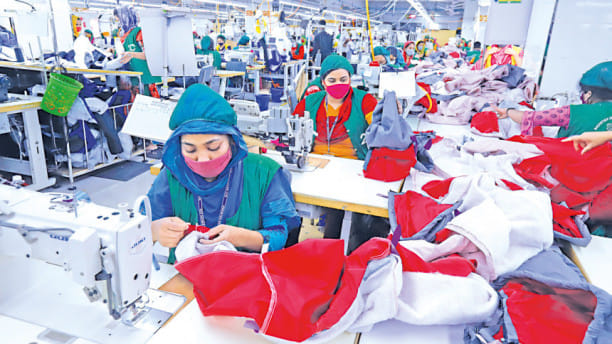Reality is different from perceptions about RMG sector

For years, discussions about Bangladesh's ready-made garment (RMG) sector have been shaped by narratives that do not always reflect the current reality. While global media often highlights past tragedies or focuses on labour concerns, it overlooks the significant strides made in safety, sustainability, and ethical business practices. However, while acknowledging these improvements, it is equally important to recognise the challenges that remain, particularly regarding workers' rights and fair wages.
As a factory owner, I have seen firsthand the transformation of our industry. Our factories have undergone rigorous upgrades, yet misconceptions persist. Changing perceptions is crucial not only for our reputation but also for ensuring sustainable growth for our workers and businesses alike. We all stand to benefit.
The collapse of Rana Plaza in 2013 was a turning point for Bangladesh's garment industry. In response, the Accord on Fire and Building Safety in Bangladesh and the Alliance for Bangladesh Worker Safety were introduced, leading to over 38,000 factory inspections and significant remediation efforts. Today, over 1,600 factories have successfully remediated safety issues under the accord, making our factories among the safest in the world.
Despite these advancements, concerns remain about compliance in smaller subcontracting factories, where enforcement is weaker. While larger exporters meet international safety standards, ongoing monitoring is needed to ensure that all workers, regardless of factory size, operate in safe conditions. Standards need to be raised across the board, and I would argue that we are, as an industry, only as good as our weakest link.
The garment sector employs over 4.2 million workers, of whom nearly 60 percent are women, according to a 2023 Bangladesh Bureau of Statistics report. While minimum wages have increased over the years, they remain a contentious issue. In November 2023, the government raised the minimum wage for RMG workers to Tk 12,500 ($113) per month, a 56 percent increase from the previous Tk 8,000 set in 2018. However, worker unions argue that this wage is still not a living wage given rising inflation and living costs.
Efforts to improve working conditions go beyond wages. Several factories have introduced healthcare facilities, childcare centres, and skill development programmes, but these benefits are not yet widespread. A stronger commitment from both government regulators and factory owners is needed to ensure that every garment worker receives fair compensation and a dignified working environment.
Bangladesh is now home to over 200 LEED-certified green garment factories, the highest number in the world. According to the US Green Building Council, investments in solar power, water recycling, and energy-efficient production have positioned Bangladesh as a leader in sustainable apparel manufacturing.
However, challenges persist. Textile dyeing remains a major environmental concern, with rivers suffering from industrial waste. While some factories have installed effluent treatment plants (ETPs), enforcement gaps allow smaller factories to discharge untreated waste. The industry must work collectively to ensure all manufacturers comply with environmental regulations. It only takes a negative report on one factory for us all to be tarred with the same brush.
One of the most effective ways to reshape perceptions is by increasing transparency. International buyers often arrive in Bangladesh with outdated assumptions about factory conditions. Factory tours provide them with firsthand insight into modern, well-equipped facilities that meet and often exceed global safety standards.
However, transparency must extend beyond factory tours. Ensuring that all labour policies are publicly documented, workers have a voice in decision-making, and violations are addressed swiftly will reinforce Bangladesh's reputation as a responsible manufacturing hub. Encouraging direct engagement between buyers and workers, rather than curated visits, will strengthen trust in our commitment to ethical production.
While the industry has made commendable progress, we cannot overlook the areas that still need improvement. Ensuring living wages, enforcing compliance in smaller factories, and addressing environmental concerns must remain priorities.
Bangladesh's RMG sector is a success story; but for it to remain sustainable, we must acknowledge both achievements and challenges. By embracing full transparency, strengthening labour rights, and reinforcing environmental responsibility, we can ensure that our industry is recognised not just for its growth, but for its commitment to fairness and ethical business practices.
As stakeholders, factory owners, workers, policymakers, and international buyers, we have a shared responsibility to uphold the integrity of Bangladesh's most vital industry. Only through collective effort can we truly transform the narrative surrounding our garment sector for both local and global audiences.
Mostafiz Uddin is managing director of Denim Expert Limited. He is also the founder and CEO of Bangladesh Denim Expo and Bangladesh Apparel Exchange (BAE).
Views expressed in this article are the author's own.
Follow The Daily Star Opinion on Facebook for the latest opinions, commentaries, and analyses by experts and professionals. To contribute your article or letter to The Daily Star Opinion, see our guidelines for submission.

 For all latest news, follow The Daily Star's Google News channel.
For all latest news, follow The Daily Star's Google News channel.
Comments